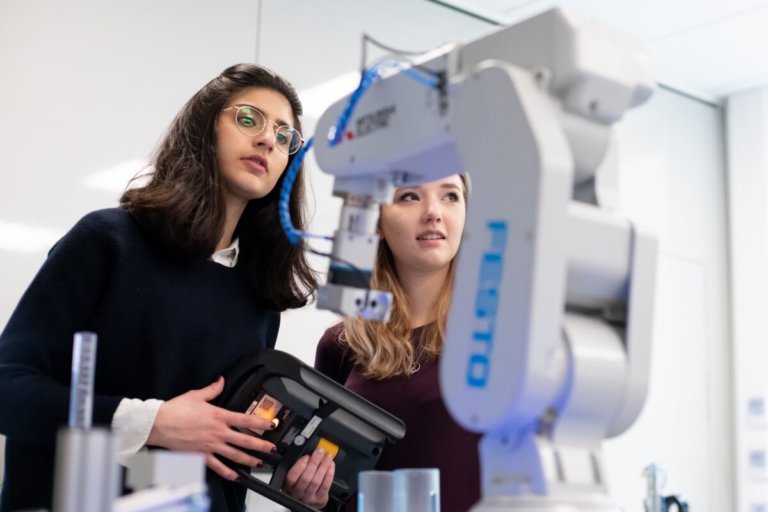
The Department of Engineering and Design at the University of Sussex supports the achievements of their female engineering students and academics.
They recognise that, in the context of an engineering workforce that is 89 percent male, female engineers can benefit from targeted support and they are delighted to acknowledge the contributions of all female engineers and in particular the achievements of their own students and academics.
There are many things that Lucy Hughes (recipient of the UK 2019 James Dyson Award), Antonia Smith (winner of the Santander Female Student Award 2019) and Jazz Turner (named most promising female engineer in 2020 by Ricardo Engineering Prize competition) have in common.
One can mention their passion for designing new products, their commitment to their profession and above all, they are graduates or current students from the University of Sussex’s Department of Engineering and Design.
Hughes, Smith and Turner are the most recent additions to the University’s list of alumni and students making an impact on the engineering world.
Lucy, a Product Design graduate is the creator of MarinaTex, a unique plastic alternative using organic waste from the fish processing industry.
Sir James Dyson, founder of global home electronics maker Dyson said: “The James Dyson Award received some thought-provoking ideas this year – and more female entrants than ever – making the judging very difficult. Ultimately, we decided to pick the idea the world could least do without.”
“MarinaTex elegantly solves two problems: the ubiquity of single-use plastic and fish waste.”
Lucy is an excellent example of how the Department is paving the way for budding female leaders in engineering.
It is inspiring them to think innovatively, problem-solve effectively and make a difference in society through engineering breakthroughs.

Jazz Turner, one of our outstanding Mechanical Engineering students, is also a SussexSport scholar. She received a sports scholarship and an academic scholarship from the University of Sussex. Jazz is not only an outstanding student, as the Ricardo award proves, but also an accomplished athlete.
Upon finishing fourth in two events at the National Competition for Sailing and becoming the first female finisher in this year’s Brighton Half Marathon wheelchair race, she was nominated for Disabled Sport Personality of the Year.
She’s also an inspirational figure as she is one of the leaders of US Girls Can and ActiveUS which advocate for more female and disabled participation in sports. She plans to use her degree for the greater good of the disabled sports community.
“I’m in a wheelchair now, but I never thought I’d stop doing sport. I can still compete in sailing against those without disabilities as I have a yacht – a 2.4 m one-person keel boat – that’s been especially adapted with hand control,” she said.
“I chose Mechanical Engineering because I’d built my own boat. I like building things and hope to work in medical engineering, designing and making equipment for those with disabilities.”

Learning from strategic research and industry-linked programmes
To study at Sussex is to get opportunities – for both undergraduate and postgraduate students – to take part in exciting, high-quality and maximum-impact research.
The Department focuses on niche and strategic engineering areas such as 5G and Mobile Communications, Industrial Informatics and Signal Processing, Robotics and Mechatronics, Sensor Technologies and Turbomachinery.
These areas are supported by teaching and research facilities such as the newly-opened Future Technologies Laboratories and collaborations with global and local companies such as GE Aviation, Plessey Semiconductors, Jaguar Land Rover, Riccardo, Huawei, Samsung and many others.
Engineering female students here can also rely on the guidance and support of inspiring academic mentors like, for example, Dr Elizabeth Rendon Morales and Dr Esra Sorguven.
The Department recognises that sometimes those best suited to solving technological problems specific to women, are the women themselves.
Dr Elizabeth Rendon-Morales, senior lecturer in Electrical and Electronic Engineering, and her research team have developed a highly-sensitive sensor to measure unborn babies’ heartbeats more accurately and without the need to visit a hospital.
The potential of the technology to be adapted for human mothers and babies was recently recognised by Dr Heike Rabe, a consultant neonatologist at Brighton and Sussex Medical School.
Dr Rendon-Morales said: “Currently expectant mothers with health concerns about their babies have to go through the stress of going to hospital to check on the heartbeat of their child.”
“With this new technology, they will be able to do this from the comfort of their own home, which will be much better for the welfare of mother and baby.”
Follow the University of Sussex on Facebook, Twitter, YouTube, Vimeo and Instagram.
Liked this? Then you’ll love…
University of Sussex: The key to your future engineering success
Explore multiple career avenues with a degree in Mechanical Engineering







